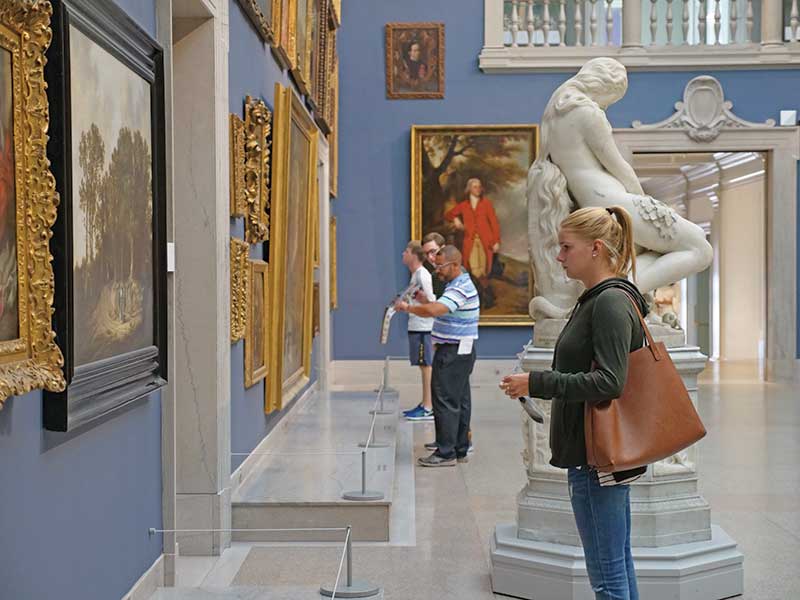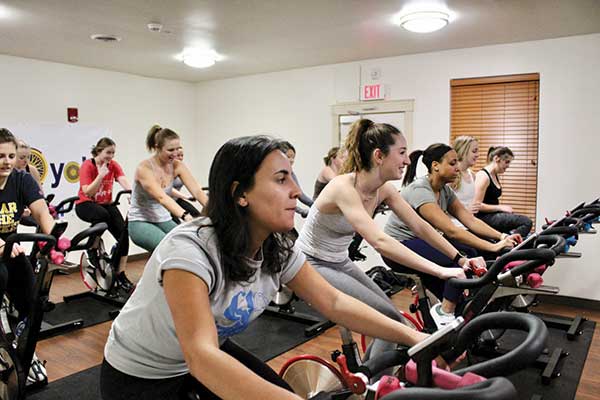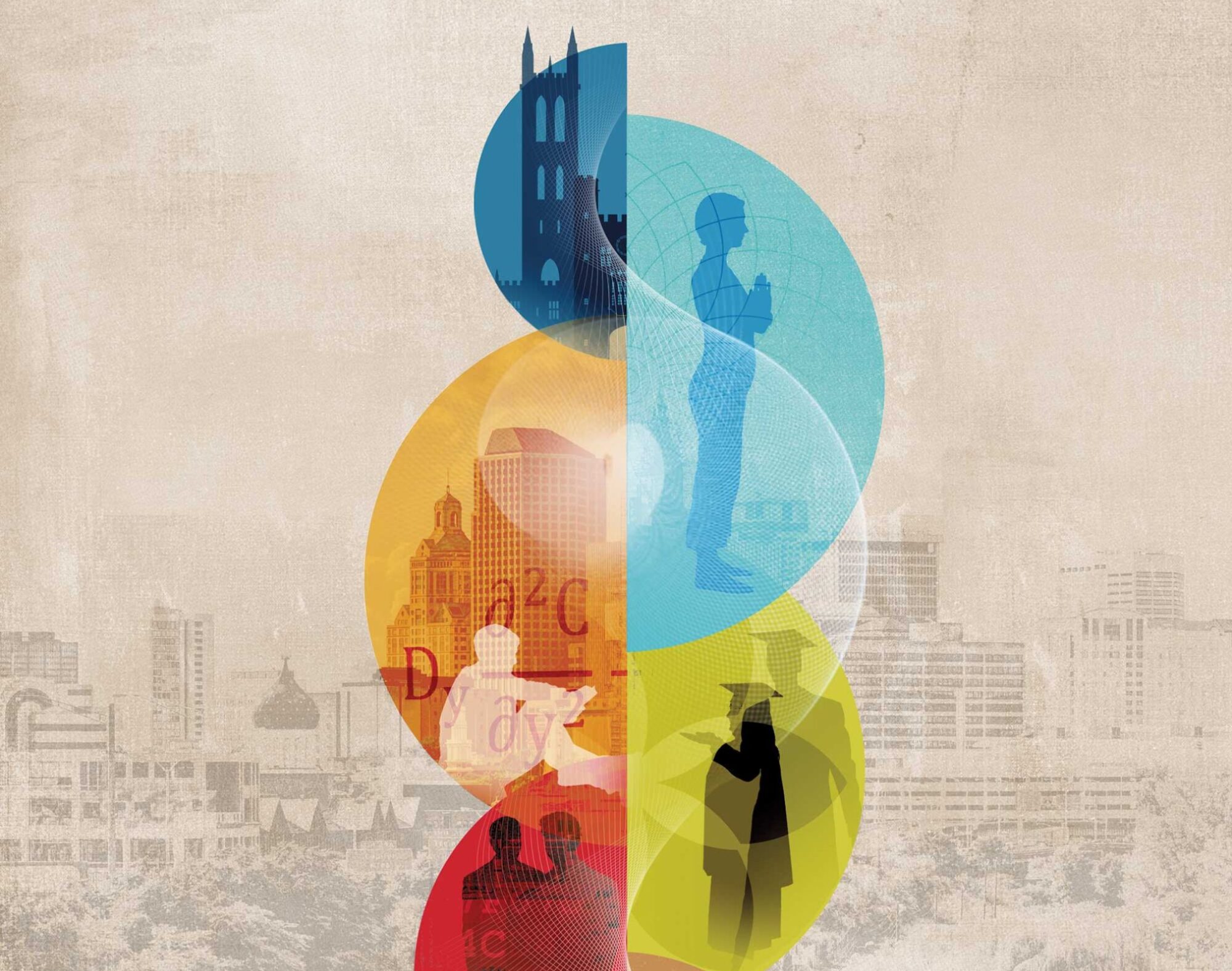Real-world experiences, wellness program to complement academic core
By Andrew J. Concatelli
Illustration By Stephanie Dalton Cowan
“We believe this 21st-century curriculum will prepare Trinity students who are both thinkers and doers.”
So says Sonia Cardenas, acting dean of the faculty and vice president for academic affairs, about the most significant revisions to the Trinity College curriculum in more than a decade. The changes—including the introduction of a broad variety of credit-bearing co-curricular experiences and a wellness program—will go into effect in fall 2021 with the incoming Class of 2025.
“The new curriculum reflects so much of what makes Trinity distinctive,” says Cardenas. “It reflects our identity as one of the only selective liberal arts colleges in the country that is also in a capital city, and it highlights the power of a liberal arts education that also takes seriously real-world experiences and overall wellness.”

In the updated curriculum, students will complete 32 core academic credits and three additional credits known as the Trinity Plus, which can include a personalized, exploratory option—with all co-curricular credits, all academic credits, or any combination of both—or a more integrated option through a faculty-designed experiential certificate. The new curriculum also incorporates a wellness requirement, intended to promote personal well-being.
The complex process of revising the curriculum, led by the faculty Curriculum Committee and the Office of the Dean of the Faculty, has taken place over several years, with the changes overwhelmingly approved by the faculty in fall 2019. Associate Dean for Curriculum and Associate Professor of Theater and Dance Mitchell A. Polin ’96, who chaired the Curriculum Committee, says that the new requirements reflect a different approach to learning, with an increased emphasis on experiential components and the need to connect more to a postgraduation world.
“What takes place in the classroom is directly related to what takes place outside of the classroom,” Polin says. “The students carry with them their experiences from the college—internships, fellowships, community partnerships, and research positions—which all contribute to the important conversations taking place in the classroom. This curricular revision acknowledges that they are whole individuals, and we need to treat them as such.”
Working closely with the Dean of the Faculty Office and consulting with students about changes they wanted to see, the Curriculum Committee crafted a detailed proposal motivated by carefully articulated goals. Brendan W. Clark ’21, a double major in public policy and law and history, served as a student member of the committee. “It is difficult to weigh the consequences of a decision, especially an academic one, without having the voice of those who directly experience the academic, curricular, and intellectual fruits of courses,” Clark says. “Student representatives bridge that gap and offer a crucial perspective on how students react to and interact with the curricular changes.”

While some co-curricular learning opportunities in the college’s home city of Hartford—including the Legislative Internship Program—already were credit-bearing experiences for Trinity students, the new curriculum offers even more ways to earn academic credits outside of the traditional classroom. These include teaching assistantships, peer teaching and mentorships, internships outside the major, summer fellowships, unpaid research with a faculty member, paid summer research, and January Term courses. “These are ways to link what’s happening at Trinity with the world and a student’s professional aspirations,” Polin says. “Our students are already engaging in a number of activities—service, research, and more—and we believe these activities should count in the students’ education. We can connect the students to Hartford and to the Trinity community through this new curriculum in ways we have not previously done to this extent.”
The experiential certificate—which is one way to earn the Trinity Plus credits—combines integrated sets of courses on a specific topic to prepare students for their next steps after Trinity. Each cohesive certificate program would include at least one academic course and at least one co-curricular activity. Polin says that proposals for experiential certificates were gathered from departments across campus in the winter and spring.

“The opportunity to have a coherent experience is one that’s incredibly exciting,” Polin adds. “Classes taken outside of the major don’t have to be random. This option can help students think further about how they organize their time at Trinity and connect to what they’re passionate about. We want to make a student’s time at Trinity as dynamic an experience as possible, both inside and outside of the classroom.”
Brendan Lynch ’20, a computer science major who served as a student member of the Curriculum Committee, says it’s important that the new curriculum embraces the breadth of experiences of today’s students. “The world changes, and so the curriculum changes with it,” he says, adding that he appreciates that the curriculum will reflect how learning can take place in highly interconnected ways. “The experiential certificate in particular offers an excellent framework that encourages faculty to explore how their areas of expertise interact with the work of colleagues across departmental and divisional lines and allows for students to connect their work in the classroom to life beyond our campus,” he says.
Cardenas notes, “That’s the purpose of the experiential certificate—to bridge academic and co-curricular experiences around a single theme, preparing students explicitly and in more focused ways for the future of work and community.”
Likewise, it was the idea of embracing a holistic view of students cultivating their best selves in and out of the classroom that led to the wellness program. Polin says that this part of the curriculum will help students establish and sustain positive values, habits, and behaviors during their time at Trinity and beyond. “It’s our hope that the wellness requirement will give students the skills to balance their social, academic, extracurricular, and professional commitments,” he says.

Professor of English Sarah Bilston, a Curriculum Committee member who worked on the wellness program, says that it aims to help students build healthy habits to sustain happy, balanced, and meaningful lives. “We hope the requirement will encourage students to make time and space for wellness; they can have fun, try things out, and meet new people,” Bilston says. “College is obviously about learning and growing intellectually, but it’s also a time for students to learn how to transition to the world beyond our campus and to think deeply about the part they can play in building a caring, responsible community.”
The wellness program comprises three categories: Mind, Body, and Spirit; Community Health and Responsibility; and Civic and Environmental Engagement. “Students will participate in four wellness experiences, including at least one from each of these three categories,” Bilston says. Each wellness experience requires a minimum of eight hours of direct engagement and provides an opportunity for student reflection.
Cardenas says she believes that the wellness program and other elements of the new curriculum add up to provide students with an exceptional range of real-world learning that takes place outside of the traditional classroom. “These experiences, alongside their core liberal arts education and our incredible network of global alumni, are what will prepare students for lifelong professional and personal success,” she says.
THE BASICS
- 32 core academic credits
- Three additional credits—the Trinity Plus (co-curricular and/or academic credits or an experiential certificate)
- Wellness requirement
